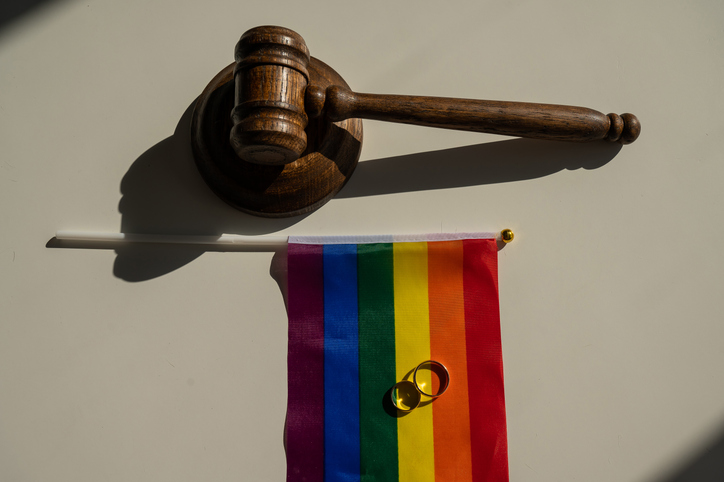Family Law And LGBTQ+ Rights
Two important Supreme Court decisions, Obergefell v. Hodges (2015) and Pavan v. Smith (2017), officially established national recognition of non-traditional, LGBTQ+ relationships. Before those decisions, each state individually passed laws permitting or not permitting same-sex marriages. This lack of uniformity complicated navigating the formation and maintenance of same-sex marriage, especially if the couple moved from the state where they were married to another state that did not recognize their marriage.
Those two decisions now ensure family law rights and protections for the LGBTQ+ community throughout the country. Examples of these rights include:
- Ability to file a joint tax return;
- Access to the spouse’s employer-provided health insurance;
- Joint home ownership, as tenants by the entirety;
- Inheritance of estate, including if the spouse dies intestate;
- Medical decisions in the event of one spouse’s incapacitation;
- Ability to foster, adopt or use Assisted Reproductive Techniques to obtain children and have equal, legal parent status of those children.
It is not surprising that as more LGBTQ+ couples opt to get married, they are also encountering the same challenges keeping their marriages together as their heterosexual-marriage counterparts. The divorce rate within these two groups is about the same.
The requirements and processes of divorce are governed by the laws of individual states and are applied equally regardless of the sexual orientation of the couple. In California, same-sex marriages do have a few areas of added complexity in applying those laws. We will briefly discuss three of those here.
Property Division for Same-Sex Divorce
The community property laws of California apply equally to same-sex couples as to heterosexual couples:
- With certain exceptions, assets and liabilities acquired between the date of marriage and the date of separation are community property and must be split 50-50 in a divorce;
- Assets and liabilities acquired before the marriage and after the separation are the separate property of the individual spouse.
The relatively recent nationwide recognition of same-sex marriages potentially creates issues for same-sex couples who were together for many years before a legal marriage or even a legal domestic partnership (available in California since 2000) was possible for them. During those years, same-sex couples may have acquired property during years before they were able to get married or enter a domestic partnership.
Same-sex couples may try to work around these issues through prenuptial or postnuptial agreements, or mediated property settlement agreements. Provided the agreements do not violate applicable state laws, they can supersede the community property rules and allow for property acquired before same-sex couples were able to get married or enter a legal domestic partnership to be equally divided. In attempting to enter into said agreements, the advice and representation of an experienced family law attorney can prove invaluable.
Spousal Support (Alimony)
The question of spousal support in a same-sex divorce has the same issue as that of property division: the length of the marriage.
California does not mandate alimony in any divorce, though it may award it depending on the circumstances of each spouse. Among the factors used to make the decision is the duration of the marriage. In general, it is more likely for alimony to be awarded, and the amount to be higher, if the marriage was longer.
In the case of a same-sex divorce, for many LGBTQ+ couples, their cohabiting relationship may be significantly longer than the actual marriage. This can complicate the traditional equation used in determining if and how much alimony is to be awarded.
In 1976, the California Supreme Court ruled in Marvin v. Marvin that an unmarried cohabitant could legitimately claim support from their partner if they could establish their eligibility for it. That eligibility was typically found in any kind of contractual domestic agreement made between the couple. This agreement did not need to be in writing, but merely implied. Since that ruling, judges can, at their discretion, award “palimony” (“pals”+”alimony”) in these cases. A factor in awarding palimony may be whether a same-sex couple registered a legal domestic partnership. Mediating a support agreement between a divorcing same-sex couple may be an effective way of resolving this issue. Attempting to mediate a support agreement is generally best accomplished with the assistance of competent family law counsel.
Child Custody, Child Support, and Parental Rights
If a married LGBTQ+ couple wish to have children together, they may either adopt a child or utilize an Assisted Reproductive Technique (ART), including surrogacy, to conceive a child.
Adoption provides a straightforward means to establish a legal-parent relationship with the child. Adoptions by same-sex couples are fully recognized within the United States, although international adoptions may be limited for them depending on the laws of the country they are adopting from.
In an ART situation, California law provides a presumption of parentage for same-sex couples if they were married or registered domestic partners at the time the child was born. It further provides this presumption if the couple was cohabiting, though not yet legally together, but both of the couple’s names appear on the birth certificate and both spouses actively engage in raising the child.
Another option to establish legal parenthood is to file a “Declaration Of Parentage” with the California Department of Child Support Services. This declaration has all of the force of a court order. There are two exceptions where it cannot be used:
- Surrogacy;
- If the other biological parent is the (former) spouse of one of the individuals in the current LGBTQ+ couple.
If the presumption of parentage requirements are not met, or if a Declaration of Parentage cannot be used, then the couple must petition for a court order declaring each spouse to be the legal parent of the child.
The question of legal parenthood naturally has implications in a later divorce. The first task in these matters is to determine who are the child’s legal parents.
Legal parents have custody rights. They also have child support obligations. When a same-sex divorce happens and children are involved, legal parenthood will first be established if it was not previously. This may draw out the divorce proceeding, complicate the case, and add additional expenses.
We Support You
The family law attorneys at Hoover Krepelka have experience navigating the unique complexities of LGBTQ+ divorces. To ensure equal economic and parent/child protections for both parties in your divorce, reach out to us today for a consultation.




